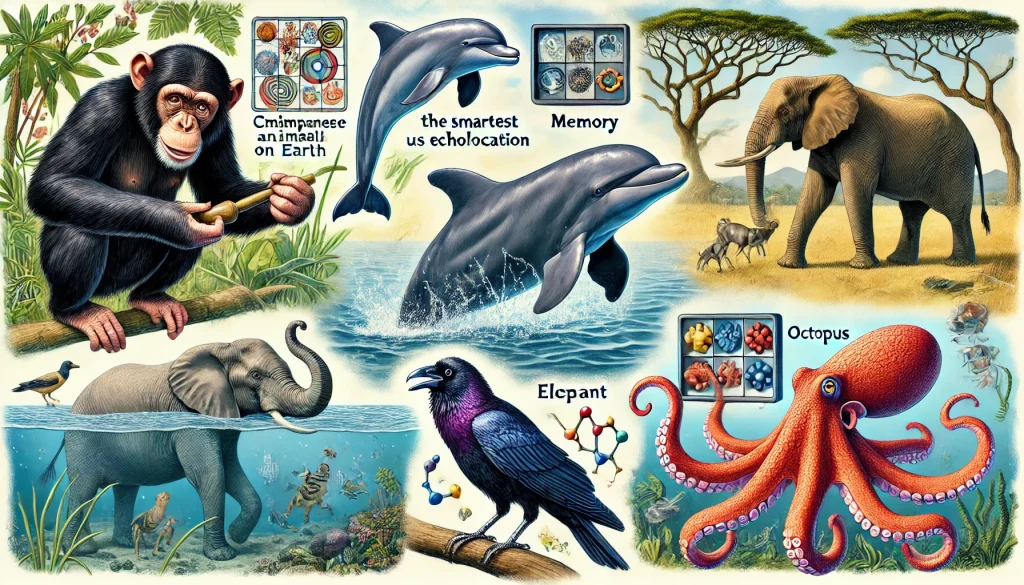The Smartest Animals on Earth: Exploring the Most Intelligent Species in the Animal Kingdom

When we think of intelligence, humans are often the first species that comes to mind. However, intelligence in the animal kingdom is a fascinating subject, revealing that many creatures possess remarkable cognitive abilities. From problem-solving skills to social behaviors, these animals exhibit forms of intelligence that rival, and sometimes surpass, our own. In this article, we’ll explore the smartest animals on Earth, showcasing their extraordinary capabilities and why they deserve recognition as the brainiest beings in the natural world.
Table of Contents
1. Chimpanzees: Humanity’s Closest Relatives
Why They’re Smart:
Chimpanzees are often considered the most intelligent non-human animals, thanks to their close genetic ties to humans. Sharing about 98% of our DNA, chimps are highly skilled in problem-solving, tool use, and social interaction. Their ability to learn new skills, such as using sticks to extract termites from mounds, is a testament to their cognitive prowess.
Social Intelligence:
Chimpanzees live in complex social structures where they exhibit behaviors such as cooperation, empathy, and even deception. Their ability to understand social hierarchies and form alliances shows a deep understanding of social dynamics.
What the Experts Say:
Dr. Jane Goodall, a renowned primatologist, has spent decades studying chimpanzees in the wild. She has documented their use of tools, complex emotions, and even their ability to learn sign language in captivity. According to Goodall, “Chimpanzees are capable of intellectual achievements once thought to be unique to humans.”
2. Dolphins: The Brainy Marine Mammals
Why They’re Smart:
Dolphins, particularly bottlenose dolphins, are known for their exceptional intelligence, which is evident in their complex communication, problem-solving skills, and social structures. They have large brains relative to their body size, and their cerebral cortex is highly developed, allowing for advanced cognition.
Communication and Echolocation:
Dolphins communicate using a variety of clicks, whistles, and body language. They also use echolocation to navigate and hunt, which requires sophisticated auditory processing. This ability to “see” using sound is a unique and highly advanced form of intelligence.
What the Experts Say:
Marine biologist Dr. Denise Herzing has studied dolphin communication for over 30 years. Her research suggests that dolphins have a complex language that may include grammar and syntax. “Dolphins demonstrate an intelligence that is not only emotional and social but also highly cognitive,” says Herzing.
3. Elephants: The Gentle Giants with a Great Memory
Why They’re Smart:
Elephants are known for their incredible memory, emotional intelligence, and problem-solving abilities. They can remember locations of water sources and recognize individual humans and other elephants even after many years. Their ability to grieve for lost family members and exhibit self-awareness by recognizing themselves in mirrors further showcases their intelligence.
Tool Use and Problem Solving:
Elephants have been observed using tools in the wild, such as branches to swat flies or dig for water. They also show an understanding of cooperation; for example, in controlled experiments, elephants have worked together to pull two ends of a rope to receive a food reward.
What the Experts Say:
Caitlin O’Connell, an expert on elephant behavior, highlights their emotional and social intelligence. “Elephants display behaviors that suggest they are capable of understanding the thoughts and intentions of others, a trait known as theory of mind, which is a key indicator of high intelligence.”
4. Crows: The Feathered Einsteins
Why They’re Smart:
Crows, and other members of the corvid family, are incredibly intelligent birds known for their problem-solving skills, tool use, and the ability to plan for the future. They can solve complex puzzles, such as those that require multiple steps to achieve a goal, and they have been observed using tools to obtain food.
Understanding Cause and Effect:
Crows demonstrate a high level of understanding of cause and effect. In experiments, they have been able to drop stones into a container of water to raise the water level and access a floating treat. This understanding of the physical properties of objects is a sign of advanced cognitive abilities.
What the Experts Say:
Dr. John Marzluff, a wildlife scientist who has studied crows extensively, notes that “Crows possess a form of intelligence that rivals that of primates. Their ability to adapt to different environments and solve problems creatively is truly remarkable.”
5. Octopuses: The Cephalopod Geniuses
Why They’re Smart:
Octopuses are often referred to as the “geniuses of the ocean” due to their impressive problem-solving skills, adaptability, and complex behaviors. Despite being invertebrates, their intelligence is on par with that of many vertebrates, making them one of the most fascinating creatures in the sea.
Escape Artists and Tool Users:
Octopuses are known for their ability to escape from enclosures and solve puzzles to obtain food. They can also use tools, such as using coconut shells as shelters. Their ability to learn from experience and exhibit short- and long-term memory is a strong indicator of their intelligence.
What the Experts Say:
Marine biologist Dr. Jennifer Mather has conducted extensive research on octopus behavior. She points out that “Octopuses demonstrate a level of problem-solving ability and cognitive complexity that is surprising for an invertebrate. Their intelligence is a product of their solitary lifestyle and complex nervous system.”
Conclusion
Intelligence in the animal kingdom is diverse and multifaceted, with different species exhibiting unique cognitive abilities that suit their environments and lifestyles. From the highly social and emotionally intelligent chimpanzees and elephants to the problem-solving prowess of dolphins, crows, and octopuses, these animals challenge our understanding of intelligence.
As we continue to study and learn from these remarkable creatures, we gain not only a deeper appreciation for their abilities but also a better understanding of the evolutionary processes that have shaped intelligence across species. Recognizing the intelligence of animals is essential for their conservation and welfare, as it reminds us of our shared capacity for thought, emotion, and social connection.
References:
- Dr. Jane Goodall, Primatologist, and Anthropologist
- Dr. Denise Herzing, Marine Biologist, and Dolphin Researcher
- Caitlin O’Connell, Behavioral Ecologist and Elephant Expert
- Dr. John Marzluff, Wildlife Scientist and Crow Behavior Specialist
- Dr. Jennifer Mather, Marine Biologist and Cephalopod Researcher
Understanding the intelligence of animals not only fascinates us but also encourages us to protect these species and their habitats, ensuring that they continue to thrive and inspire future generations.


